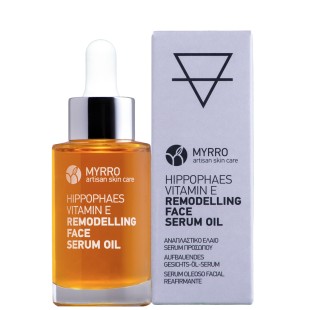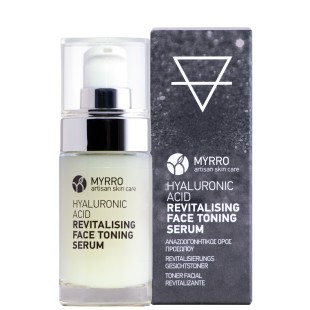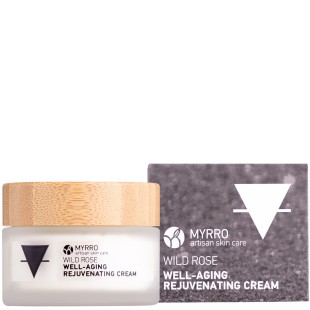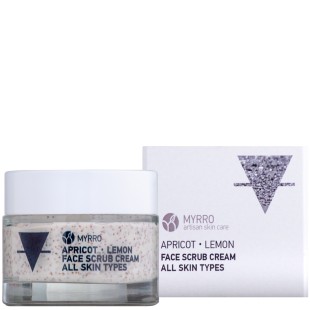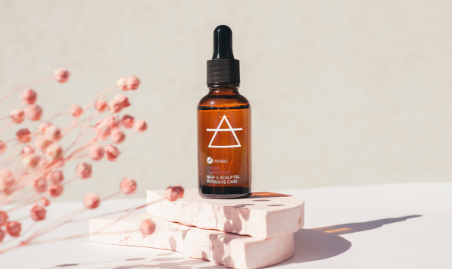Tips for a beautiful & healthy skin
Beautiful skin is a healthy skin!
Our skin is the largest organ of our body, which surrounds and primarily protects the rest of the body and acts as a means of communication with its environment.
However, it is quite exposed to harmful external factors such as pathogenic microorganisms, various pollutants or ultraviolet radiation that inevitably destroy it.
In order to protect itself, it forms a protective hydrolipidic film on its surface which consists of moisture and sebum, which are secreted by the sweat and sebaceous glands respectively.
What exactly is sebum?
Sebum is a natural secretion of the body that reaches the surface of the skin through the hair follicles. It has an oily texture with a rich beneficial effect for the skin. It contains lipids, fatty acids and antioxidants that shield the skin's moisture. At the same time, they protect it from UV radiation and other harmful factors and soothe irritations and inflammations. Its pH is slightly acidic, making the skin a hostile environment for viruses and bacteria.
Normal or abnormal sebum secretion is what characterizes different skin types and shapes their unique needs.
What are the main characteristics of healthy skin?
1. Hydration: Water performs important functional roles throughout the body, and in the skin as well. It is found inside the skin as well as on its surface and offers softness, elasticity and resilience. Depending on the degree of dehydration, the skin can show a dry texture, itching or wrinkles, while it loses its vitality and elasticity.
2. Softness, firmness and elasticity: They are characteristics interrelated to each other that require the cooperation of various factors, which act in combination and are related to the correct structure and function of the skin.
3. Clean texture: It is important as the appearance of dryness or oiliness is related to the abnormal secretion of sebum in the skin and can have consequences such as skin diseases or acne.
4. Color: The appearance of discolouration is related to the differentiated secretion of melanin from cells of a certain area of the skin. Changes such as freckles are often due to sun exposure or age and have no harmful effects. Other discolorations, however, may be related to diseases or allergies, so in any case it is good to consult a dermatologist.
The human body is able to synthesize all the substances necessary for healthy skin. The ingredients it takes in from external sources such as food or care products come to complement and enhance its action.
However, the condition of the skin is significantly affected by the quality of life and our habits, such as diet, exercise, sleep, stress and the hygiene conditions, as well as by factors in the wider environment such as the weather or atmospheric pollutants .
Nutritional tips for a clean and healthy skin
The skin has the ability to utilise a part but not all of the ingredients that we apply on the surface, so it is important that our diet is balanced in order to provide the body with the valuable nutrients that it needs both for the skin and for the rest of its functions.
1. Water consumption is fundamental to skin quality, with 6-8 glasses of water per day usually being an ideal intake. A part of the water can be replaced by some herbal drink, either aromatic for a pleasant taste or therapeutic for a more targeted use. Herbs that help detoxify the body, such as nettle, have obvious effects on the skin as well.
2. The skin is positively affected by a diet rich in foods of high nutritional value that provide the body with valuable components such as proteins, fatty acids, vitamins, antioxidants and fiber. You don't need to look for an extreme diet as long as you incorporate into your daily life the consumption of fresh fruits and vegetables, nuts, legumes and whole grain products, to the extent that is possible for you.
3. Alcohol consumption and smoking should be limited. They have a negative impact on the skin as they cause the formation of free radicals and dehydration.
Simple daily tips for a clean and healthy skin
1. Good blood circulation rejuvenates the skin and the body in general, promoting good oxygenation and cell function. Gentle exercise and good stretching will help you revitalise your whole body and give you a sense of well-being.
2. Most functions related to the renewal and repair of the skin take place at night, which is why a good night's sleep is essential. The calm mood before sleep significantly improves its quality and offers more rest. You can relax by taking a bath with warm water, drinking a warm drink and using relaxing essential oils to scent your room. Avoid screens before bed as the blue light they emit can suppress melatonin secretion and the feeling of sleepiness.
3. Avoid hot water when washing the body and face as it completely removes the normal moisture and oiliness of the skin, leaving the skin completely dry and more vulnerable. It harms both dry and oily skins.
4. It is important to wash our clothes, sheets and towels regularly to avoid contamination by microorganisms that can cause inflammation and irritation of the skin or stimulate acne.
Skin care routine
Skincare is completed with a skincare routine tailored to your personal needs and goals.
There are six basic steps that form the basis of skin care:
1. Start with cleansing!
Use a mild cleansing soap suitable for your skin type. Cleansing removes toxins, germs and impurities from the skin's surface and will leave it feeling fresh and light.
2. Remove dead cells!
Exfoliating to remove dead cells and clear pores of blackheads and sebum helps the skin absorb whatever product you apply in the next steps.
3. Moisturise the deepest layers of the skin!
A light, oil free serum, which consists of small molecules (such as hyaluronic acid) that can penetrate deeper into the skin, effectively rejuvenates the skin and balances it before you apply richer products. Use it both on face and neck.
4. Moisturise and Nourish the under-eye area with an Eye cream!
Use a specially formulated eye cream to restore moisture, as this area is particularly delicate and sensitive.
5. Apply the appropriate moisturiser!
Choose a cream suitable for your skin, which will contain both moisturising and nourishing factors that are mainly found in the oils it contains and are rich in beneficial fatty acids and vitamins. Use it both on face and neck.
6. Get extra soft skin with the remodelling serum oil!
For an added dose of luxury especially at night, a face oil is a unique way to soothe your skin and seal in moisture. Try layering this rich nourishing facial oil for dull and dehydrated skin over your other skincare products to leave your face super smooth and glowing.
Basic tips for all skin types
1. Start with a simple skincare routine to find out if a product suits you and gradually enrich it. When trying a new product, first apply to a small area of skin to check for any unwanted reactions in your body.
2. Skin care products do not change the skin instantly. Duration and repetition in their application are necessary to see the promised results.
3. In a richer routine it is important to apply the products in the proper order so that one does not interfere with the absorption of the other. This is easily achieved by starting with the product with the thinnest texture and working towards the one that will take longer to absorb. Ideally, wait a few minutes before switching from applying one product to the next.
4. Prefer products with natural ingredients as they are friendly to the skin and can provide it with the nutrition and hydration it needs. Synthetic fragrances and dyes can cause irritation and stress the skin in many ways.
5. In case you use make-up products it is important to remove them from your face as soon as possible and definitely before going to bed.

